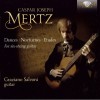| Country: | Slovakia |
| Period: | Romantique |
Biography
Johann Kaspar Mertz (in Hungarian: János Gáspár Mertz) (17 August 1806 – 14 October 1856) was an Austro-Hungarian guitarist and composer.
Caspar Joseph Mertz (baptised Casparus Josephus Mertz)[1] was born in Pressburg, now Bratislava (Slovakia), then the capital of the Kingdom of Hungary and part of the Austrian Empire. He was active in Vienna (c.1840–1856), which had been home to various prominent figures of the guitar, including Anton Diabelli, Mauro Giuliani, Wenceslaus Matiegka and Simon Molitor. A virtuoso, he established a solid reputation as a performer. He toured Moravia, Poland, and Russia, and gave performances in Berlin and Dresden. In 1846 Mertz nearly died of an overdose of strychnine that had been prescribed to him as a treatment for neuralgia. Over the following year he was nursed back to health in the presence his wife, the concert pianist Josephine Plantin whom he married in 1842. Some speculation may lead one to the conclusion that listening to his wife performing the romantic piano pieces of the day during his period of recovery may have had an influence on the sound and unusual right hand technique he adopted for the Bardenklänge (Bardic Sounds) op. 13 (1847).
Mertz's guitar music, unlike that of most of his contemporaries, followed the pianistic models of Chopin, Mendelssohn, Schubert and Schumann, rather than the classical models of Mozart and Haydn (as did Sor and Aguado), or the bel canto style of Rossini (as did Giuliani). Though the date of his birth indicates that that was the logical influence, since Sor was born in 1778, Aguado in 1784 and Giuliani in 1781 while Mertz in 1806, a difference of about 25 years.
The Bardenklänge are probably Mertz's most important contribution to the guitar repertoire – a series of deceptively easy character pieces in the mould of Schumann.









